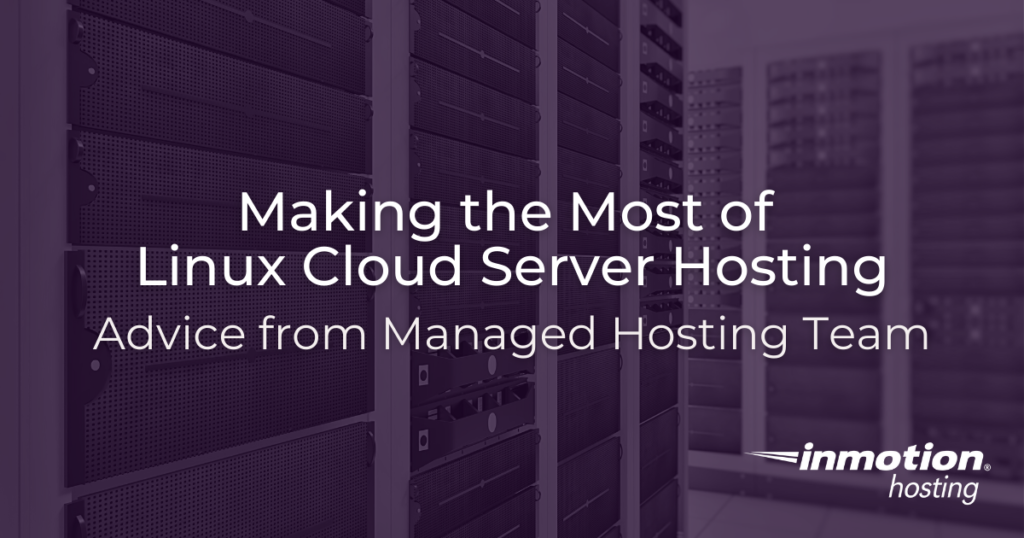
After talking with a system administrator (sysadmin) about Managed VPS Hosting, I wanted to ask someone else about unmanaged, Linux cloud servers. We generally recommend the cloud server to advanced Linux users who are comfortable in the command-line interface (CLI), or terminal. But sometimes, the best way to learn something is to just go for it and learn as you go.
For someone wanting to graduate from using Shared cPanel hosting, a Linux ISO file in a VirtualBox virtual machine, or using WebHost Manager (WHM) to manage server software, a headless Linux server is a good progression.
Without the cPanel interface to fall back on, you’re left to research and decide between possible methods to solve an issue using developer documentation, Stack Overflow forums, internet relay chat (IRC) channels, etc. Sometimes, you might make mistakes. Big mistakes. Hopefully, you have recent server backups, or snapshots, to restore if something disastrous happens.
Below, we ask our mysterious Linux templars Managed Hosting representatives about InMotion’s Cloud Server Hosting plans.
Advice from our Managed Hosting Team
First, thanks for agreeing to this, guys. Not everyone is okay with having their name out there. And you guys are a bit reclusive, though always helpful when I break something. To start, why do you enjoy working with Linux?
Thomas: Working with Linux offers flexibility in its use. There’s many Linux distributions to suit various needs whether those needs are casual or advanced.
Nick: The filesystem is laid out simply and installed applications place their files in predictable locations. A lot of other applications that are installed follow similar file and folder structure, which continues this trend. Being open source is beautiful in that if I want to know what something does, I can for the most part pull up the file or files and view their contents. Extending that further, I think it’s wonderful that projects can be contributed to by anyone. The amount of customization is incredible! You can tailor your environment to just the way you want.
What does the Managed Hosting team do on a regular day? What’s your role with cloud server, and bare metal servers hosting since that’s also unmanaged?
Thomas: On a daily basis, technical solutions sought through Managed Hosting include server optimization, custom software installation, and the troubleshooting thereof.
Nick: We provide a range of services due to the open nature of our department. Some of our work is taking live contacts and addressing issues on the fly, otherwise known as triage support. Some of our clients need a plan to be executed by us, whether it be to install a list of software, or help configure their web server to allow more traffic. And then we also help offer guidance when it comes to best practices for your web server, server-side and website application security, among others.
A lot of the time we’ll get a request to install software we have no experience with and so will take the time to learn about it or lean on fellow team members who may have experience with that software. When not assisting customers, agents can be found working on personal projects, such as improving with ash or Python scripting, or working on updating or improving internal scripts to help the general workflow of our company as a whole.
Nick is understandably busy at this time. Continuing, what misinformation do you often hear about Cloud Server Hosting?

Thomas: With Cloud Server Hosting, the biggest misconception I believe regards security. A cloud can be interpreted as intangible and almost Mount Olympus-esque. However, Cloud Server Hosting is still governed by the same security practices for its users.
What are the most interesting challenges you’ve dealt with on Cloud Server Hosting?
Thomas: As we specialize in cPanel, it’s easy to get used to many of the methods used by cPanel for doing various tasks. On a cloud server not running cPanel, it’s always interesting to see how to get solutions working from the ground up.
This question may help with future content ideas. What software do you commonly recommend to cloud server administrators?
Thomas: Security and server monitoring are always going to be important so on that note I would recommend ConfigServer Security & Firewall (CSF) as a good default firewall and monitoring through tools such as Icinga.
I’ll look into Icinga and how it compares to Splunk and Elastic (ELK) Stack for security information and event management (SIEM). I felt good about finishing the Managed VPS or Cloud Server Hosting article. But what is your advice for anyone considering dropping a cPanel VPS for Unmanaged Cloud Server Hosting? What do you think is the most important thing to keep in mind?
Thomas: When going for either plan, the most important aspect is whether or not the platform will fulfill and accommodate the software or use you are looking to have.
Keeping it simple. What type of user do you think should consider our Cloud Server Hosting instead of a cPanel VPS?
Thomas: The type of user that should consider Cloud Server Hosting over a cPanel VPS should be looking to accomplish a technical solution that would potentially conflict with the presence of cPanel. Sometimes, custom software will not run well or at all if installed onto a machine where cPanel is. Beyond those constraints, it could be more fun!
We offer Debian, Ubuntu, and CentOS. The last suggestion was to add a SuSE option. What Linux operating system (OS) would you like to see us offer?
Thomas: I currently like our line-up.
. . . Fair enough. Any last bits of advice or closing statements you’d like to offer to those considering an unmanaged VPS?
Thomas: Using an unmanaged VPS does have its own benefits of many functions not requiring to be done using cPanel methods, but this can also be a hindrance as cPanel does offer convenience in many ways as well.
Final Thoughts on Cloud Server Hosting
This interview didn’t go in-depth regarding web server speed optimization. We offer NVMe SSD hosting for greater uptime and overall network performance from the start. This indirectly leads to search engine optimization (SEO) before changes such as integrating a content delivery network (CDN).
Still have questions about whether a cPanel VPS or cloud server with another web hosting control panel is best for you? Let’s talk in our Community forum. Or contact our Sales team to discuss our recommendations for your next project.
Experience full control over your server environment and deploy the best operating and management systems that fit your needs with our reliable Cloud VPS Hosting!